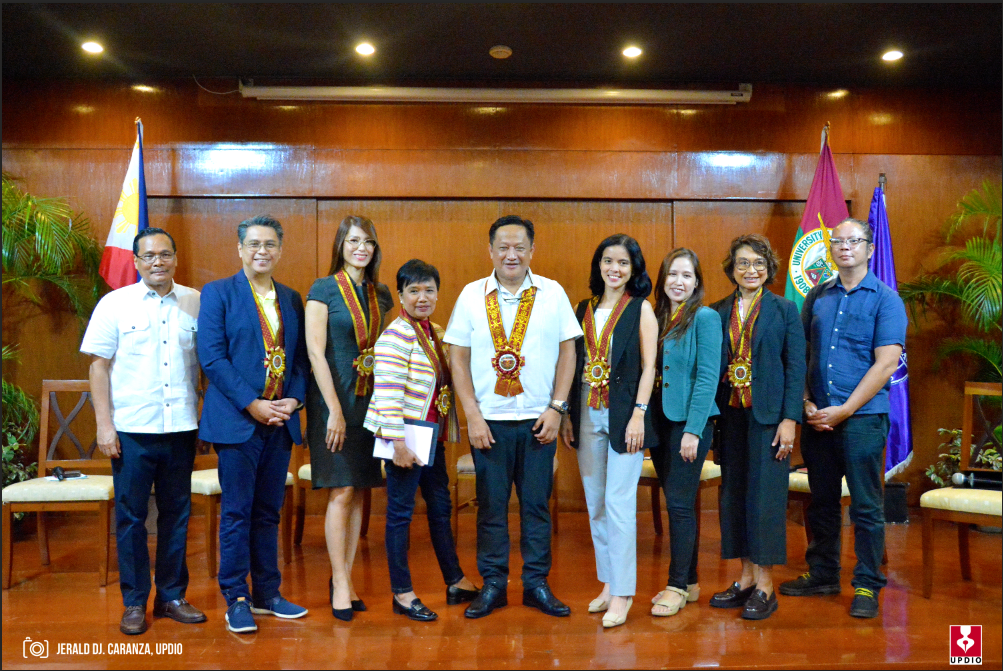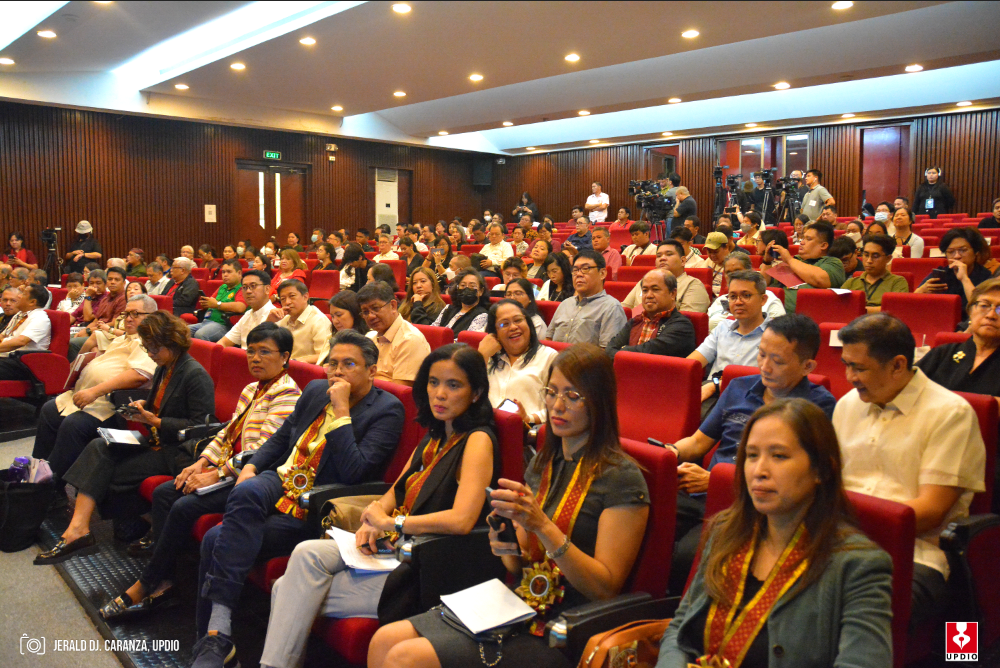UP President Angelo A. Jimenez presented to the press his administration’s strategic plan for UP, which carried the theme Transformative University in the Service of the Nation.
According to a brief the UP System presented, the UP Strategic Plan 2023-2029 “embodies UP’s commitment to contribute to national growth and sustainable development” and is “rooted in the principles of honor, excellence, and service.”

The strategic plan has 10 flagship programs (FPs) implemented across the UP System: academic excellence, inclusive admissions, research and innovation, open distance e-learning (ODeL), archipelagic and oceanic virtual university (AOVU), active and collaborative partnerships, arts and culture, expansion of public service offices, quality management system and quality assurance, and digital transformation.
Introducing Jimenez to the attendees, veteran journalist and UP alumna Ces Drilon said the president “is totally committed to seeing UP as a university of impact that positively changes lives for generations.”
Known media personalities who are also UP alumni were invited to interview Jimenez about the FPs. With Drilon as moderator, panel discussants were GMA7’s Malou Mangahas, TV5’s Robby Alampay, Philippine Star’s Iris Gonzales, NET 25’s Nina Alagao-Flores, and Philippine Daily Inquirer’s Anna Cristina A. Tuazon.
Referring to UP’s inclusive admissions flagship program, Mangahas asked “Ano iyong achievable target by 2025… 2029? Ilan ang galing sa poverty learning areas ang gusto ninyong makuha?”
Although he admitted that this FP will take several administrations to execute, Jimenez answered, “I would be very happy if at least 50% from public high schools will be accommodated in UP starting now.”
At the moment, UP has identified around 350 students from geographically disadvantaged areas (GDA) that the University will admit and provide with educational support (food, transportation, allowances, etc.)
“We are starting with 350 from the GDA, from the poorest families in the country. Just imagine the kind of impact [this can make], especially for those who never had a college graduate in the entire family history, those histories of families where poverty has circumscribed their lives for generations,” Jimenez said.
Alampay asked Jimenez for his opinion about what gap or gaps the FP on research and innovation addresses.
“Ang large gap talaga dito is that very few of the research happening right now has direct tie-up with the industry. Until now, industry comes in and distributes that to the market, meaning society, because schools are not marketers, schools are not business. So that is the missing link,” Jimenez explained. “That is why… we are promoting science and technology hubs. An innovation hub must attract the industry, must attract investors so that the work in our laboratories can be cheaper, than if it would be developed by private laboratories,” he added.
For her part, Gonzales asked Jimenez if he intended for the overseas Filipino workers (OFWs) to come home in relation with ODeL, to which Jimenez answered, “No. They have jobs there and we have hundreds of thousands who don’t have jobs here.”
“What we are trying to do is turn education in the Philippines so that they never have to go abroad,” Jimenez explained.
Jimenez said through ODeL, the OFWs will be given “the opportunity to move from lower-paying job to higher-paying jobs, which in turn would mean an increase in remittance to the Philippine government.”
Meanwhile, in answer to Alagao-Flores’ query on his plans for the arts and culture, Jimenez said he plans to use arts and culture to move people to action.
“I believe in the art for its intrinsic value. Human consciousness appeals to the aesthetics. I want to use arts and culture as a trigger for us to move. Arts and culture will enhance national identity and goad people into action,” he said.
He said people are prompted to move because of the inspiration art and culture bring. In addition, Jimenez shared his plans to establish a national institute for arts and culture education and a national institute for arts and culture artifacts preservation.
In terms of the FP on academic excellence, Tuazon asked what revisions in the core curriculum the president wanted.
Jimenez shared he wants a program that will reinforce the idea of service.
“What I really wanted to do was to come up with a program where our students gain direct experience in service and are enlightened by it and are ennobled by it,” Jimenez said.
He explained that this would require developing values such as humility and kindness, “Kung papipiliin ako, anong maiiwan sa akin and be identified with it… I would choose kindness… Ang misyon ko talaga, kapag may mga taong nakakita sa mga taga-UP sasabihin nila, ‘Uy mga taga-UP o, iyong mababait.”

In discussing AOVU, Jimenez said he aims for the FP “to create a larger framework that can be used as a basis for unity.” He also said the AOVU was not a response to the ongoing geopolitical rivalry happening in the West Philippine Sea.
“We are going to use this study which we already have to create a unique national identity for Filipinos… Our multi-ethnicity, our multi-identity… are in fact sources of strength… This change of mindset is what we would like to put on the table to advance our objective as a people with a unique identity,” Jimenez said.
Jimenez also addressed the issue of artificial intelligence (AI) in relation with the FP on digital transformation.
“AI is good. UP is the first university in the Philippines to come up with this AI framework. AI must be learner-centered or human controlled… Whoever uses AI must be accountable for using this. It is a matter of influencing the use and further development of AI to advance very human and clearly defined objectives.
Jimenez elaborated on the FP on active and collaborative partnerships.
“Our collaborative partnerships [are] first is academic-government, next is industry and civil society. Finally, the environment. That’s how we frame our collaborative partnership.
Jimenez also underscored the importance of a university, particularly UP, to the public.
“Universities must have direct relevance in terms of people’s lives and industry needs,” he said.
The media forum at the Malcolm Theater was held on June 18. For more details about UP’s flagship programs, visit https://up.edu.ph/up-strategic-plan-2023-2029/.
